Honoring Liberty
Mark A. Kellner September/October 2005
Getting your Trinity Audio player ready...
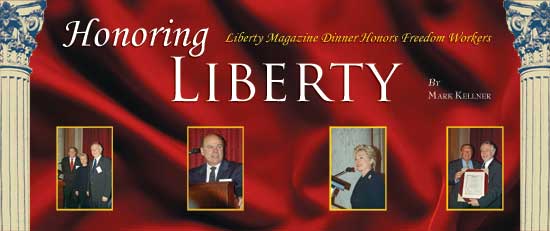
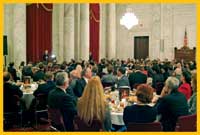
|
| Part of the guest group at the 2005 Religious Liberty Awards Banquet in the Russell Senate Caucus Room |
"Those of us who are people of faith are so aware of what that means in our lives that it is sometimes a challenge for us to understand our obligations to make space for nonbelievers," Senator Clinton, who was elected to a six-year Senate term in 2000, said to an audience of more than 200. This is the third annual religious liberty dinner sponsored by Liberty magazine and the IRLA; all three have been held in the historic Senate Caucus Room on Capitol Hill.
Calling the Seventh-day Adventist Church a "vital force" for religious freedom at home and abroad, Senator Clinton lauded the involvement of the church, its 100-year-old Liberty magazine, and the International Religious Liberty Association, which
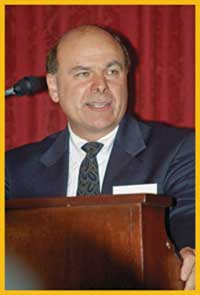
|
| Editor Lincoln Steed informed attendees of the significance of Liberty's 100 years. |
This was the first personal appearance by Senator Clinton at the dinner. Last year she offered a recorded greeting to the group that was circulated to Liberty magazine supporters. Previous speakers at the event included Senator Sam Brownback, Republican of Kansas, and Representative Chris Smith, Republican of New Jersey. President George W. Bush had also sent video greetings to the Adventist Church.
Senator Clinton said, "With 14 million church members worldwide and 1 million here in the United States, you understand very well the importance of religious freedom and freedom of conscience. It is your work, often, on the front lines of religious liberty that helps to tell the rest of the world the story of the oppressed; in so many ways denied their rights to live and believe as they choose."
She added, "I also want to thank the church for the work you do for people in need here in our country and indeed around the world. Your health-care system—something I care deeply about—is a great example of your living your faith."
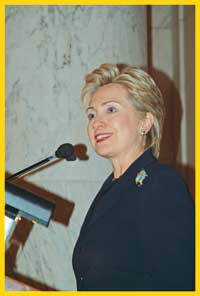
|
| Guest speaker for the event was Senator Hillary Clinton |
James Standish, executive director of the North American Religious Liberty Association, praised Senator Clinton for her steadfast support of the Workplace Religious Freedom Act (WRFA), a bill the Adventist Church supports. Standish noted that in the United States, three Adventists every day, on average, lose their jobs over Sabbathkeeping issues. The WRFA is designed to protect the rights of people of faith, including Sabbathkeepers, in the workplace.
Standish also commended Senator Clinton for promoting religious freedom abroad and at home, particularly as a cosponsor of the WRFA, reintroduced last month by Massachusetts senator John Kerry, the 2004 Democratic Party U.S. presidential candidate, and Senator Rick Santorum, Republican of Pennsylvania.
"I hope that this will be the year that we will be successful in passing this," Senator Clinton told the audience, which included diplomats from more than 30 nations, representatives from the White House and the U.S. Department of Justice, 11 representatives from the U.S. Commission on International Religious Freedom, Adventist religious liberty workers, and many regional world presidents of the Adventist Church, along with representatives of other faiths, including Islamic, Jewish, Catholic, and Protestant groups.
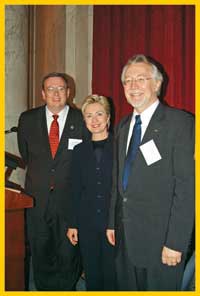
|
| Attorney James Standish, legislative liaison for the Adventist Chruch and Dr. John Graz, world director of Religious Liberty for the church, with Senator Hillary Clinton |
She also praised moves toward democracy in both Iraq and Afghanistan and said that religious freedom must be a part of the new Iraq: "We must support their efforts to create a democratic government that does protect religious freedom as they attempt to fashion a constitution and a system of government that provides for their beliefs and their tenets of faith, but does so in a context of respect for others."
"It runs against their traditions in many instances, and they will have to be very statesmanlike in order to create new space for diversity, for pluralism, for tolerance. And we must help them accomplish that," she added.
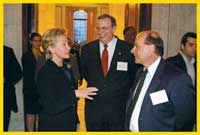
|
| Senator Clinton is welcomed to the event by Attorney Standish and Liberty Editor Steed. |
"Liberty magazine for 100 years now has held up this ideal, this dynamic of religious freedom supported by the separation of church and state. We can see that a lack of separation, an amalgamation of church and state, leads directly to religious intolerance. It leads directly to violence, genocide, all of these problems that our world is grappling with," he said. "We want. . . people to be exposed to the rationale of religious freedom the rationale that all religious activity is to be private and not meddled in by the state."
The dinner also featured awards to several people who have helped in the struggle for religious freedom: Bert B. Beach, former Public Affairs and Religious Liberty director for the Adventist Church; Roger W. Coon, a grassroots activist for religious freedom; Roland Hegstad, longtime Liberty editor; Richard L. Fenn, a retired religious liberty director; and Ambasador Robert Seiple, former head of World Vision and the first United States ambassador for religious freedom.
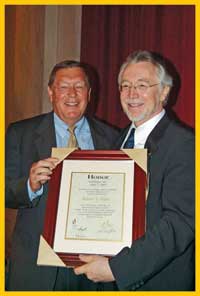
|
| First ever U.S. Ambassador for Religious Freedom, Dr. Robert Seiple, was given an "Honor" citation by Dr. John Graz on behalf of Liberty and the IRLA |
Seiple told the dinner audience that respect for the beliefs of others, and not mere tolerance, was required.
"We need to understand our faith, and we need to respect the faith of our neighbors. Respect leads to a celebration of all that we have in common, leading to the fact that all of us here have been created in the image of God," he said.
The state of Maryland, home to the IRLA and Liberty magazine, offered its own recognitions of religious freedom at the banquet. Elisha Pulivarti, executive director of the Governor's Office on Asian-Pacific American Affairs, brought a commendation from Maryland
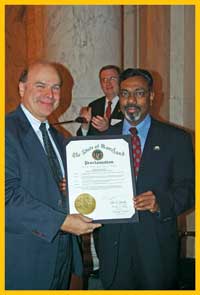
|
| Editor Steed and a representative from the governor's office hold a proclamation in honor of Liberty magazine issued by Maryland Governor Robert L. Ehrlich, Jr. |
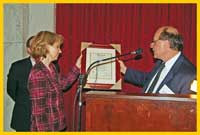
|
| Editor Steed reads the text of an award honoring longtime Liberty editor Roland Hegstad. His daughter Kimberly Handel accepted on his behalf. |
___________________________
Mark Kellner, a journalist and communications specialist, writes from Silver Spring, Maryland.
___________________________